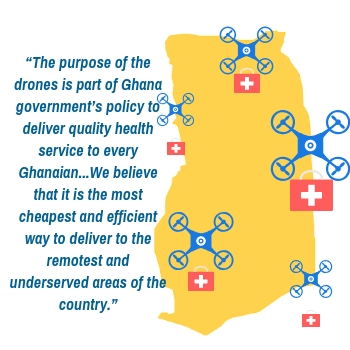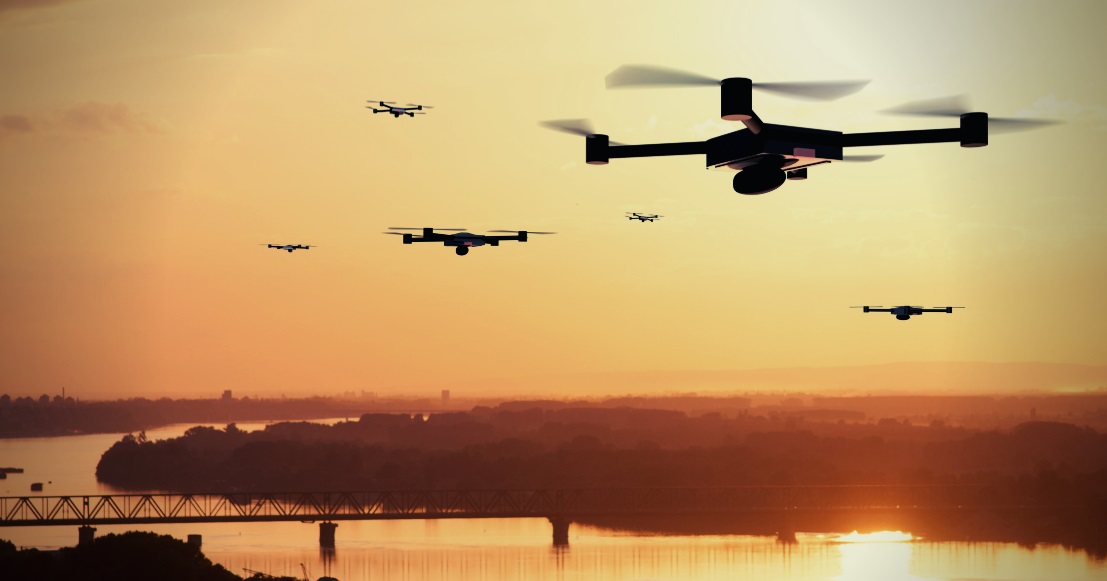Ghana Lawmakers Approve Controversial Drone Deal

This week, Ghana’s parliament approved a deal that would spend $12.5 million (in USD) over the next four years to create a system of medical supply delivery to remote areas of the country using drones. The system will be implemented through a partnership between the Ghanaian government’s own Health Service and US-based drone company Zipline, which we’ve written about before and which has assisted in implementing a similar system in Rwanda.
Government officials say that the deal, known officially as the Drone Delivery Project, will bring the world’s most advanced healthcare supply chain to the small African country. But while the government vote on the project was overwhelmingly in favor of the plan (102 votes for, 58 votes against), the proposal has been accompanied by massive public outcry from Ghana’s citizens.
The Ghana Medical Association, an organized non-governmental group of doctors from the country, issued a statement calling for an immediate suspension of the project implementation. They say that the Drone Delivery Project is a clear waste of government money in a country that still has less than 100 ambulances nationwide. Furthermore, they point out that the plan was pushed through without any consultation from medical health professionals: “It is appropriate for us as an Association of Medical Doctors and Dentists, who are stakeholders in the policy, to offer our perspective on the matter even though we have not been consulted.”

In a general sense, the detractors feel that the deal is more about making Ghana appear technologically advanced and impress Western companies (like Zipline themselves, no doubt) while ignoring the concerns of ordinary Ghanaians.
The Director-General of Ghana’s Health Service, Dr. Nsiah Asare, spoke to journalists in Accra about his view of the project: “The purpose of the drones is part of Ghana government’s policy to deliver quality health service to every Ghanaian…We believe that it is the most cheapest and efficient way to deliver to the remotest and underserved areas of the country.”
The country’s Vice President, Dr. Mahamadu Bawumia, of the center-right New Patriotic Party, didn’t mince words as he defended the deal as being essential to improving Ghanaian health care: “If you have a technology that can help a dying mother, or someone dying of snake bite, bring the medicine! I think it’s something that is so important and we should grab and make use of.”
“It is not a political issue,” he added, “Because everybody who is dying will not ask whether you’re NDC or NPP.” NPP, of course, is the New Patriotic Party itself, while the NDC refers to the center-left National Democratic Congress, which has largely been opposed to the deal.
“We’ve said it that this one, it is a ripoff,” said Cassiel Ato Forson, NDC parliamentarian and Minority spokesperson on Finance. “Even if everyone else supports it, I – Cassiel Ato Forson – will not support it because I think it is a ripoff…The Vice President is leading this country unto a path of unrighteousness because obviously, we can use $27.8 million for something better.”
At Dronethusiast, we often cover drone news from the perspective that more technological progress in the industry is always better. But this case brings up an important consideration that we should always keep in mind. Progress should never come at the expense of peoples’ lives, and as much as we love drones, there are many countries in the world that may legitimately need to wait to implement them as part of their infrastructure.
What do you think? Do you believe that Ghana is facing such a situation now? Or would you rather have fast medicine than ambulance support for hospitals? Let us know what you think of this tricky issue in the comments (and by all means, let’s try to keep it respectful.)






In my opinion, this program is a big joke and a terrible disservice to the people of Ghana.
While it sounds innovative and a grand step towards the future of medicine, especially in remote locations, I must ask how will these drugs be properly dispensed to the patient? who will be there awaiting the delivery? How will the drones navigate to the exact location? I am sure there are many more questions given a day or two tho think about this issue.
In an incredibly poor country, such a huge amount of money spent on such a project is astounding to me. What about a trial program of say perhaps USD$1,000,000? Surely with that amount the government, medical community and people could get a realistic sense of the success of the program.
It’s not really about a choice of drones versus ambulances. This is a red herring. The ability for drones to get medicines and emergency supplies to underserved regions will be a game changer for many communities. The opposition is being driven by the medical sector whose funding models rely on people walking through their doors. The political positioning is connected to the money.
Regarding Ghana medical drones: 1. Can a drone do the job given its flight capabilities and limitations? 2. Can a drone system practically serve a majority of the population? 3. Given the cost, is there a cheaper way to do the job and get the same or better results? A no to any of these questions disqualifies the drone program.
Initially I thought, “What a great idea. Delivering essential life saving medicines or supplies by drone.” However while they may be able to do that, that 28 million would buy a lot of ambulances or an air medevac unit. I only know a little of Ghana and that is because I had a cousin living there a number of years ago. It is a poor, small west African country and it seems to me that the cost of this (what I would call) limited service could be better employed in other technology.